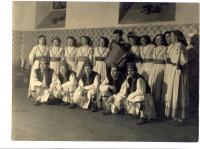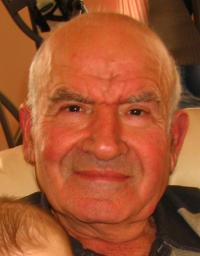Angelos Jordanidis
* 1935
-
"He had duties. He was responsible for all the officers that arrived. He was an officer. I've got some books about it at home. They would meet up and confer. I told him: 'Dad, it's all long gone now, it'll never happen that you'd start a new rebellion.' He said: 'That doesn't matter, we meet up and we think back on the good and the bad.' He still believed in it."
-
"We were in farming. Dad had a lot of fields, he was a farmer. Us children, there were seven of us, we had to work dawn till dusk. As you know, there weren't any machines in those days, we had to do everything by hand. Then again, we were doing well. But then they somehow managed to persuade Dad to go into politics, said his life would be easier, he wouldn't have to sweat his back off on the fields. And at the time he believed the functionaries that propagated this, and he went into politics. He left us, Mum, the children, and joined the partisans in the resistance."
-
"There was an old monastery in the middle of the forest. There were about a hunderd and fifty of us there. There was a balcony circling the monastery, the corridors were built with stone. That's where they put us to sleep. We slept one next to the other in a circle. I remember we couldn't fall asleep. We were hungry, they gave us just hot soup every day. That was hot water and a few grains of rice with a bit of bread to go with it. But what was worse,and I remember that a lot, those were the lice. They marched about like ants and bit us all over. We couldn't do anything to get rid of them."
-
"I remember how as a twelve-year-old boy I was coming back home. We had a cow, so I'd been to set her to graze. Suddenly I see soldiers in black uniforms around our house. Those were the death soldiers, that's what they were called. They surrounded the house and all the other buildings we had, too. They started breaking windows, then they set it all on fire. I just saw the flames and the smoke. I didn't know what was going on. Then my relatives told me those were the evil soldiers. We were the only ones of the whole village who had their house and everything razed by them. We didn't have anywhere to live, the soldiers were looking for Mum. We had to hide. Then I started crying a lot, and I went on foot to the Yugoslavian border. Our field was only about a kilometre away from the border. We saw the border guard patrol back and forth. The Yugoslavians stopped me and asked why I was crying, so I told them there were evil soldiers at our home, that they burnt everything and nothing remained. They left me there and we watched the smoke. We even had a new barn, because it was a custom of ours, animals first, then us. The soldiers even gave the order that whoever should take a bucket and try to help extinguish the flames, they'd be shot on the spot."
-
"After 1953, Red Cross began reuniting families. So then we knew our parents were alive. Dad came back in 1953, he was wearing a uniform, I didn't even know it was my dad. They called me into one house, out of the blue. There were several of them sitting there, it was in Jeseníky, and I didn't know which one was my dad. It was terrible. It all got explained afterwards."
-
Full recordings
-
v Bohdanči, 14.07.2010
(audio)
duration: 01:11:46
Full recordings are available only for logged users.
They loaded us into wagons like cattle.
Angelos Jordanidis was born in 1935 in northern Greece. His family owned an estate of considerable size, however his father joined the partisans and during the civil war, their house was razed to the ground. Angelos, his mother, and six brothers had to leave Greece in 1947. First they went to a Macedonian monastery, where they received lodgings for three months, then further on to a Greek settlement near Novi Sad [in current day Serbia - transl.]. After the split between the Soviets and the Yugoslavians they were sent to Czechoslovakia. Angelos ended up alone in the children’s home Prostřední Bečva near Rožnov. There he learned Czech. He then went to study at a vocational engineering school in Zlín. After graduating he passed entrance exams to a technical school in Kutná Hora. Here he spent forty-six years as a construction worker at a tobacco factory. Angelos Jordanidis married a Czech, they have two sons together. They now live in Bohdanč. Despite his age, Jordanidis still works full-time at the local sawmill. He first returned to Greece in 1975, but he has never considered moving back permanently. He feels at home here in the Czech Republic.


